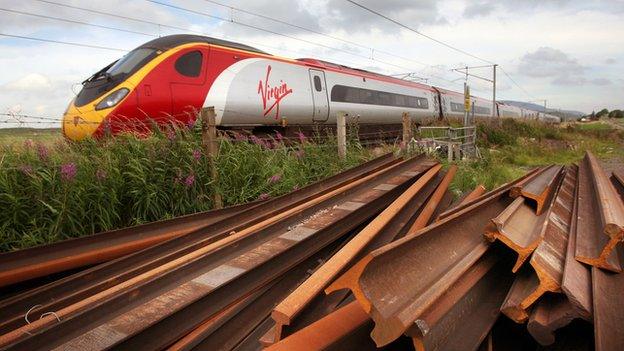Competing on the same tracks
- Published

I'm on a train, in case you're wondering. It departed Glasgow Central platform 2 at 13.40, bound for London Euston.
At platform 1, another train was preparing to depart 20 minutes later. It's also run by Virgin trains, identical in every way - as you might expect.
But what if it were a rival service, with different pricing, a different configuration of seating and coaches, perhaps quieter or perhaps more crowded, free coffee, free wifi, a cinema carriage and a different approach to customer service?
I could have made a choice on cost or on service levels, and not just between First Class and Standard.
A Ryanair of the west coast line, or an Emirates? That's the question the Competition and Markets Authority (CMA) has been asking.
Overlapping
It's taken a look at the rail market, two decades after it became the benchmark for complex, botched privatisation, and wondered out loud if - next decade - competition could actually go further.
So far, the market competition for most rail operators is in bidding for the franchise. If you win, you are expected to deliver on services and quality, as agreed with the UK or Scottish government and monitored by the rail regulator. If you lose, the best you can hope is to compete again, perhaps 15 years later.
From the passenger point of view, very few rail routes offer choice between operators. If you don't like the service, tough luck - there might be a bus along in a while. Or if you have a long journey in mind, the competition is airborne.
The CMA points out that freight competes for track time on the same rails. So how about passengers?
It's careful to spell out some of the problems - that the current model relies on an adequate level of profit to invest in the service, and that could be undercut by competition.
There would also have to be a fair allocation of the less profitable or loss-making services which operators are obliged to provide as a condition of their franchises.
But with those provisos, the question being asked is whether there could be two franchisees competing on one line.
Or more overlapping franchises. Or several licensed operators, as with buses, carrying public service obligations.
East, west and further west
The CMA says the idea is most likely to work on the west coast line, the east coast line between Edinburgh and London, and the Great Western links between south-west England/South Wales and London.
The evidence, including some from countries which already have this, is that we could see downward pressure on fares, greater incentives to raise service quality and to innovate, operational efficiencies, more effective use of network capacity, and cost savings.
That's what you tend to find in Italy, Sweden, Austria and the Czech Republic, where they have open-access competition on the more lucrative routes, and to a lesser extent in Germany. In France, the main operator has started a budget brand on some routes.
Similar results have come from competition in Eastern England on London-Hull services. Arriva's Grand Central brand has set up in competition with Virgin East Coast on the London-York part of the eastern spine.
Competition is being driven by prices on advance tickets, and also by the offer of free wifi, extending to 4G. Challengers can offer a full range of tickets on board, rather than penalising late arrivals with the top fare.
Repeatedly, innovation on price and service has forced the incumbent franchisee to respond, and passenger satisfaction hasn't suffered. On Virgin Train services, where Stagecoach is the main partner, the Perth company's Megabus online budget ticketing system also offers Megatrain options.
'People's railway'
So it's not a bad set of outcomes, if it can be made to work, without the downsides.
However, to those potential downsides should be added the fact that the UK experience of this is only on some busy journeys linking into London.
It's a reminder that more distant sectors, such as those north into Scotland, may be less attractive to challenger firms, and could perhaps subsidise competitive routes elsewhere. Aviation shows us how that can work.
It's also less likely to work in Scotland if political pressure, from Labour at least, is for a return to a nationalised 'people's railway'. Some are instinctively suspicious of the drive towards more competition.
The CMA says this is longer-term thinking. Don't expect anything to change before 2023, least of all where a franchise has years to run.
In the meantime, we can probably agree that at least it's an interesting idea.